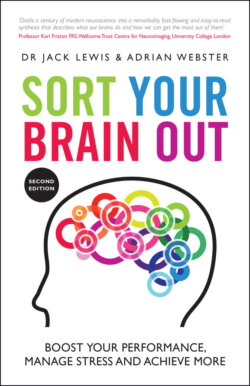Читать книгу Sort Your Brain Out - Джек Льюис, Адриан Вебстер - Страница 31
The trouble with the youth of today
ОглавлениеWhen driving in my car I often stop just down the road from where I live to let a group of teenagers coming home from school cross the road. Every time I do this, I get the distinct feeling that both my car and myself are invisible. I don't think in the past two years any of them have ever put their hand up in acknowledgement of me stopping for them or even given me so much as a nod of recognition that I exist. This worries me.
It could be that they simply lack the confidence to engage with others outside their group, particularly an adult. Maybe they just don't have the social skills to do it or perhaps common courtesy isn't particularly high up on their agenda. They appear to be so wrapped up in their own worlds that they are oblivious to everything around them. I've often thought that the possible cause of this disconnected, insular behaviour could be technology. It would be easy for me to attribute it to them being tech natives and assume their preferred mode of communication must be via email or text.
I could put it all down to technology, but then I'm always reminded of this:
“Our youths love luxury. They have bad manners, contempt for authority – they show disrespect for their elders and love to chatter in place of exercise. Children are now tyrants, not the servants of their households. They no longer rise when their elders enter the room. They contradict their parents, chatter before company, gobble up food and tyrannize teachers.”
It's a quote attributed to Socrates, the famous Greek philosopher who lived from 469 BCE to 399 BCE. It would seem that in two and a half thousand years, technology or no technology, some things just haven't changed!
– Adrian
The concerns of parents worrying that too much time spent staring at screens might ruin their kids' eyesight, on the other hand, may have been well placed. The rates of short‐sightedness, particularly in China, have rocketed over the past few decades in a manner that parallels an increasing preoccupation with screens.
That said, certain types of therapeutic video gaming are now prescribed to help people improve visual problems associated with conditions like amblyopia (aka lazy eye) and others that help middle‐aged people strengthen their eye muscles to postpone the need for reading glasses by a few years. Technology seems to forever give with one hand and take away with the other!
Another aspect of time‐displacement worth mentioning is that unless you're managing to exercise at the same time (very possible with virtual reality, but highly unlikely with conventional video games), spending endless hours in front of a screen, whether a TV, PC, laptop, tablet, games console or phone screen, isn't going to do anyone any favours in the physical health department. Excessive amounts of screen use has been directly blamed for the current global obesity pandemic, increasing rates of cardiovascular disease and Type 2 diabetes.
